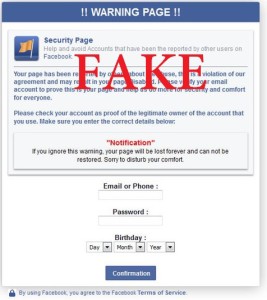Watch out for Two New Facebook Scams
April 1, 2016
Nearly everyone who has used a computer is on some kind of social media. It could be for keeping in touch with friends and family, to keep up with the latest celebrity vacation photos, or for business networking. Unfortunately, this creates many opportunities for those who like to do so to take advantage of us.
Two Facebook scams are going phishing and hoping to hook a few. One makes a threat to shut down your page and the other targets e-commerce Facebook users. This one will deliver some nasty malware that will interfere with network connections and block access to certain pages. In addition, it installs malware on the hard drive of the computer which will do various things; one is to install ransomware.
In the first instance of this story, a message is posted on the Facebook wall that appears at first glance that it is from Facebook itself. However, there are typos, the grammar is incorrect, and threatens users by saying their pages have been flagged as inappropriate by others and will be removed. It also asks to “reconfirm” your page. Then, if the link that is associated is clicked, it will ask for PayPal information, payment card numbers and details, and other monetary-related details.

The second case is a “.zip” file that is inserted into an email message. The subject line varies and is something such as “you missed a voice message,” or “there is a voice memo waiting” followed by a series of random characters; presumably to avoid getting flagged by anti-spam filtering products. Therefore, make sure to pay attention to any messages that come in and go directly to the account to check them, rather than clicking links. This is good practice for any online accounts.
Phishing comes in many forms. It can be advertisements on the side of any browser window or inserted into email messages. It can be from text messages and even through the telephone line (vishing). It’s important to know how to identify it and both of these scams have some obvious giveaways.
Remember to never click on links received in email, SMS, text messages, or posted on any social media unless you are 100% certain they are safe. Many times they are phishing for information they can use against you or sell to someone else who will. If you can’t resist, spend a little bit of time finding out through other means (separate phone call, new email message, etc.) before clicking it.
Attachments often include malware and just by opening them, you could unleash something nasty. So, avoid doing so. Again, verify they are legitimate before taking action.
Make sure anti-malware software is installed on all devices that attach to the Internet. Be sure to keep it updated. There usually is an option in settings that will do an automatic update. It’s recommended that this is active.
Keep all operating system software updated with the latest critical and security patches. If the version you are using is not currently supported, upgrade to one that is. This is important because patches are not released for unsupported software. If a vulnerability is found later, it won’t be fixed so that version will always remain vulnerable to attacks.
If you have become a victim of any scam found on Facebook, let them know by going to their help center. The company also has stated that if it plans to shut down your page, it will contact you in a more personalized manner and not by posting something to your wall or commenting on a post.
© Copyright 2016 Stickley on Security

